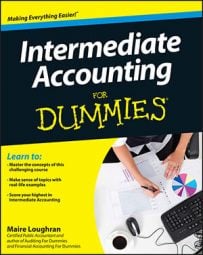Intermediate accounting delves into the more complex, more challenging aspects of accounting practices. It covers topics and accounting situations that go beyond the basics, including the following:
Time value of money: Intermediate accounting involves advanced time value issues, such as deferred annuities and long-term bonds. Annuities are multiple payments over a period of time that you either make or receive. Deferred annuities are a type of annuity contract that delays payments to the investor until the investor elects to receive them. Long-terms bonds are bonds a business holds in another company that extends out more than twelve months into the future.
Accounting for retail inventory: Inventory cost-flow assumptions, which are how the cost of inventory expenses on the income statement, are a big topic in financial accounting. An interesting expansion on this topic in intermediate accounting is accounting for retail inventory.
The retail inventory method uses a cost ratio to convert the ending inventory valued at retail to cost. Basically, this works by taking goods available for sale at cost and dividing them by goods available for sale at retail. You can then multiply sales by the resulting percentage to come up with ending inventory at cost.
Accounting for property, plant, and equipment: Intermediate accounting gets into the nitty-gritty of accounting for an involuntary conversions such as theft. When this happens, a company has to record the difference between insurance proceeds and the asset's net book value as gain or loss on disposal of asset.
Research and development expenses (R&D): This thorny topic is rarely discussed in your financial accounting class. Intermediate accounting shows you how to handle the costs of R&D, such as when a drug company is developing a product to bring to market.
Accounting for income taxes: No one likes income taxes and your financial accounting textbook discusses this topic minimally. Intermediate accounting to the rescue! Intermediate accounting covers how to calculate the difference between financial and tax accounting. A major difference between the two is financial and tax depreciation. Financial depreciation takes the long-way home while tax depreciation takes the short cut through the vacant lot! So net income between the two will differ.

